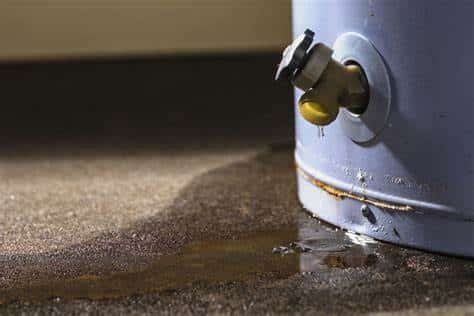
You probably weren’t expecting to find your water heater leaking. But there it is, sitting in a big puddle of water! The consequences can be anything from mild to catastrophic. A water heater leak may result in only a small amount of water on your floor that is more of nuisance; or it may be a significant flood that can leave a huge dent in your wallet.
Water heater leaks can snowball. What may appear to be a minor, insignificant leak today, can morph into a major flooding disaster tomorrow. But even a small leak is bad news for your floors, sub-floors and walls. You could be looking at extensive damage to your property and hefty repair bills in extreme cases if you do not act fast.
Water Heater is Leaking: What to Do
If you notice water on or around your water heater there’s a good chance you have a problem. Some leaking water heaters are easily repaired by tightening a fitting, others are so serious that they require a complete replacement.
This article will help you diagnose the water heater leak and show you how to fix the problem so you can determine your next steps.
If your water heater is leaking it’s important to take action as soon as possible. Even the smallest leaks can cause major issues, and whenever water is involved, there’s a possibility of developing mold.
Is Your Water Heater Leaking?
After noticing water on or around your water heater, your first task is to verify that your water heater is actually leaking. There are a number of things that could be causing the unwanted water. It could be something that is near or around your heater, or it could also be you heater but not actually a leak.
Condensation
When humid air comes in contact with a cold surface, droplets of water form in a process called condensation. The water droplets can begin to drip on to the floor and you my suspect the puddle to be a leak. This can happen on the water heater itself, associated pipes, or any nearby appliance.
Pipe Fittings
Do a quick check on your water heater and related plumbing fittings. If you’ve ruled out condensation as being the culprit, you may have a leak in your water softener discharge lines, furnace drain lines, or other plumbing.
However, if the pooling of water is directly under or in close proximity to the water heater, then it’s a good decision to look closely at your water heater.
First of all, dry the free-standing water on the floor. Then check the water heater and related plumbing fittings for any visible signs of water leakage. If nothing comes up, then the source could be close by. You’ll need to be thorough and check the entire space, as the leak could be coming from an overhead water pipe or other places that are easy to overlook.
Finding the Leak
So, you’ve confirmed that your water heater is in fact leaking. Now we need to identify where the leak is coming from. But first, it’s crucial to take a couple safety precautions.
Now it’s time to do a proper, comprehensive diagnosis/inspection of your water heater. The fixes will be covered in the next section, but for now, we need to identify the leak.
A leaking water heater has several common locations that could be the source of the problem. We’ll cover each below to help you troubleshoot the leak.
Safety Precautions
Turn OFF the Power to the Water Heater
Electric Water Heaters:
Turn OFF the power supply to your heater by flipping the breaker on your household electrical panel.
If you’re unable to identify the correct breaker switch, because the breakers are not labeled, turn OFF the main breaker.
Gas Water Heaters:
Turn OFF the power supply to your heater by setting the on/off switch or dial to OFF or PILOT. The switch is located on the gas valve which is attached to the incoming gas line at the bottom of the heater. This will stop the flow of gas to the heater.
Selecting PILOT will shut off the gas supply to the burner without extinguishing the pilot light. This is fine for draining the tank or working on water lines, but you may feel more comfortable knowing that absolutely no gas is reaching the water heater.
Turn OFF the Incoming Water to the Water Heater
Shut OFF the inflow of cold water entering your water heater.
Typically there’s a valve located above the water heater, although the design varies. It could be a lever or a dial (gate valve). To shut the valve, you either need to pull the lever down or rotate the dial clockwise.
In some situations it may be unsafe to turn off the incoming water or your water heater may not have a cold water shut off valve. If this is the case, you’ll need to close the main water shut-off valve to your house.
Be Aware: While shutting off the water supply may slow or even stop the leak, if you haven’t identified the source of the leak, you may want to wait until you know where the water is originating.
Be Careful: Always take precautions to avoid coming in contact with hot water. The temperature of heated water in your water heater is often 125° Fahrenheit, but it could be as hot as 190°F! Any contact with your skin could lead to scalding and first-degree burns.







